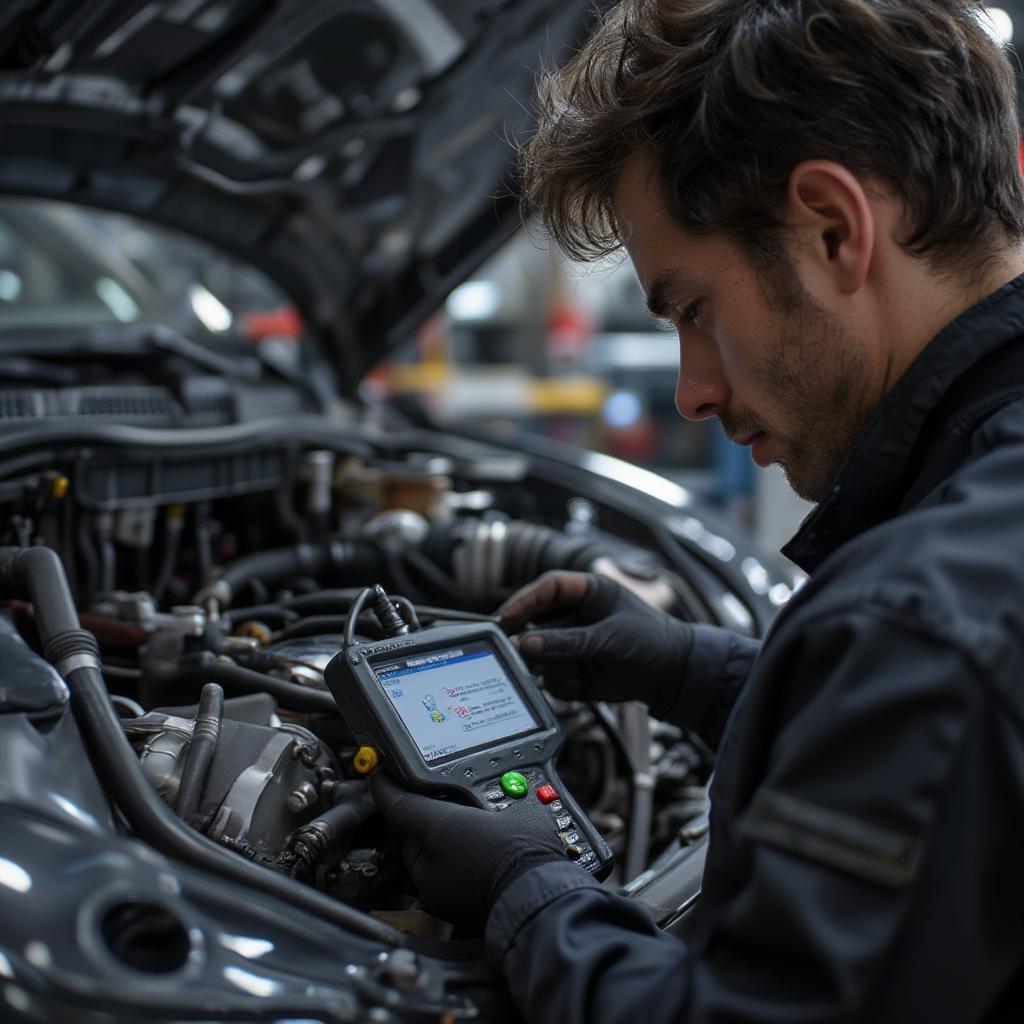Your Path to Automotive Excellence: The Mechanic Associates Degree Explained

Embarking on a career in the automotive industry? A Mechanic Associates Degree can be your launchpad, providing the essential skills and knowledge to thrive. This path blends classroom theory with hands-on training, preparing you for a dynamic field. Let’s explore what this valuable degree entails and why it might be the perfect fit for your passion.
What Exactly is a Mechanic Associates Degree?
A mechanic associates degree, often referred to as an Associate of Applied Science (AAS) in Automotive Technology, is a two-year college degree program. This program is designed to provide a comprehensive understanding of automotive repair and maintenance. Unlike certificate programs that focus on specific skills, an associates degree offers a broader education, encompassing not just technical skills but also problem-solving, diagnostics, and customer service. It’s a stepping stone for those looking to advance beyond entry-level positions and pursue higher career goals. It is a key investment in your automotive career path.
Why Choose a Mechanic Associates Degree?
Choosing a mechanic associates degree opens up a plethora of opportunities that might not be available with a certificate or simply on-the-job training. Consider these advantages:
- Enhanced Job Prospects: Employers often favor candidates with formal training and degrees. An associates degree demonstrates your dedication and commitment to the field.
- Higher Earning Potential: Typically, graduates with an associates degree in automotive technology earn more than those without formal qualifications.
- Comprehensive Skill Set: You’ll gain a well-rounded skillset that covers a wide range of automotive systems, not just specific repair tasks.
- Career Advancement Opportunities: This degree is a foundation for future growth, making it easier to specialize in areas like hybrid technology or performance tuning.
- Foundation for Further Education: You may choose to transfer to a four-year college program and obtain a bachelor’s degree in a related field.
- Industry Recognition: An associates degree can sometimes lead to certifications and credentials that validate your skills and experience to employers and clients.
What Will You Learn in a Mechanic Associates Degree Program?
The curriculum for a mechanic associates degree is varied and rigorous, covering a range of topics essential for modern automotive repair and maintenance. Typical coursework includes:
- Engine Repair: Understanding engine operation, diagnosing problems, and performing repairs.
- Electrical Systems: Learning about automotive wiring, sensors, and electronic control units (ECUs).
- Braking Systems: Mastering the theory and practical application of brake repair and maintenance, including anti-lock systems.
- Steering and Suspension: Gaining knowledge of suspension systems, alignment procedures, and steering mechanisms.
- Transmission and Drive Trains: Understanding how power is transmitted from the engine to the wheels.
- Heating and Air Conditioning (HVAC): Learning to diagnose and repair automotive HVAC systems.
- Diagnostics and Troubleshooting: Developing skills to identify and solve complex automotive issues.
- Automotive Theory and Principles: Gaining foundational knowledge about the science behind vehicle operation.
- Safety Practices: Focusing on the crucial safety protocols for working in automotive environments.
- Computerized Diagnostics: Learning to use scanning tools to diagnose and fix complex vehicle problems.
“A mechanic associates degree provides the perfect blend of theoretical understanding and hands-on skills. It’s not just about fixing cars; it’s about understanding the intricate systems within them,” says Dr. Anya Sharma, Automotive Technology Department Head at a leading technical college.
Hands-On Training: The Heart of Your Education
A significant part of your mechanic associates degree involves practical experience in a well-equipped workshop. This hands-on training allows you to apply the theory you’ve learned in the classroom, under the guidance of experienced instructors. You will work on real vehicles, learning to diagnose and repair various automotive problems. This practical approach ensures that you’re not just knowledgeable but also competent and confident when entering the workforce. The skills developed during this period are indispensable for a successful career.
Types of Mechanic Associates Degrees
While most programs are broadly similar, there can be variations based on specific specializations or focuses. Some common types include:
- General Automotive Technology: A broad program that covers all the essential areas of automotive repair and maintenance.
- Specialized Programs: Some colleges offer specializations in areas such as:
- Hybrid and Electric Vehicle Technology: Focused on the growing market for alternative-fuel vehicles.
- Diesel Technology: Concentrating on diesel engine repair and maintenance, suitable for working on trucks and heavy equipment.
- Performance Automotive Technology: Aimed at those interested in performance tuning and high-performance vehicles.
- Collision Repair Technology: Focuses on body repair and painting after accidents.
- Service Management: Prepares students for supervisory roles in auto repair facilities.

How to Choose the Right Mechanic Associates Degree Program?
Selecting the right program is crucial for your success. Consider these factors when making your decision:
- Accreditation: Ensure the program you choose is accredited, which indicates it meets high educational standards.
- Curriculum: Review the courses offered to make sure they align with your interests and career goals.
- Faculty: Look for instructors with industry experience and a passion for teaching.
- Facilities: Check out the workshops and labs to make sure they are well-equipped with modern tools and equipment.
- Internships: Inquire about internship opportunities that can provide real-world work experience.
- Job Placement Rates: Research the program’s job placement rates to gauge the success of their graduates.
- Financial Aid: Inquire about financial aid and scholarship options to help with tuition.
- Program Length and Flexibility: Consider whether the program fits your schedule and financial situation.
- Location: Choose a program that is conveniently located and has a supportive learning environment.
Career Paths After Obtaining a Mechanic Associates Degree
A mechanic associates degree opens doors to a wide array of career opportunities within the automotive industry. Some common career paths include:
- Automotive Technician/Mechanic: Diagnosing and repairing vehicles in a dealership, repair shop, or independent garage.
- Service Advisor: Communicating with customers, scheduling repairs, and managing service operations.
- Specialized Technician: Focusing on specific areas such as transmissions, electrical systems, or engine performance.
- Shop Foreman/Manager: Overseeing operations and technicians in an auto repair facility.
- Parts Specialist: Managing and selling automotive parts in a retail or wholesale environment.
- Quality Control Inspector: Ensuring the quality and reliability of vehicle repairs.
- Automotive Instructor: Teaching and training the next generation of automotive technicians.
- Independent Shop Owner: Opening your own automotive repair business.
“The automotive industry is constantly evolving. A mechanic associates degree not only gives you the skills to get a job, but the knowledge base to adapt to the new technologies that are constantly arriving,” shares David Chen, an expert in automotive career development.
The Impact of Technology on Automotive Careers
The automotive industry is rapidly evolving due to advancements in technology. Modern cars incorporate complex electronics, computer systems, and advanced driver-assistance systems (ADAS). A mechanic associates degree program keeps pace with these changes, ensuring that you graduate with the skills needed to work on the latest vehicle technologies. This includes expertise in:
- Hybrid and Electric Vehicle Repair: Training on the unique systems and technologies used in electric vehicles.
- Advanced Driver-Assistance Systems (ADAS): Understanding how to diagnose, repair, and calibrate the complex sensors and systems.
- Computer Diagnostics: Learning to use diagnostic tools to identify and solve complex automotive problems.
- Data Analysis: Understanding the data collected by vehicles and using it to improve performance and troubleshooting.
The Future of the Automotive Industry and the Role of a Mechanic
The automotive industry is undergoing a transformation. The emergence of electric and self-driving vehicles presents new challenges and opportunities for automotive technicians. A mechanic associates degree positions you to thrive in this evolving landscape. These skills will be in demand as the technology advances:
- Adaptability: Being able to learn new technologies and repair methods.
- Problem-Solving Skills: Diagnosing and solving the increasing complexity of new systems.
- Continuous Learning: Keeping up with advancements through further education and training.
- Customer Service: Understanding how to communicate and solve customer problems.
“The future belongs to those who are adaptable and embrace technology. A mechanic associates degree is the first step in a lifelong learning journey in the automotive field,” comments Maria Rodriguez, a senior instructor in automotive training.
Conclusion: Your Journey Starts Here
A mechanic associates degree is an investment in your future, providing a strong foundation for a successful and rewarding career in the automotive industry. Whether you dream of becoming a master technician, service advisor, or shop owner, this degree offers the skills and knowledge you need to succeed. By embracing both the theory and practice of automotive repair, you’ll become a well-rounded, highly-skilled professional ready to tackle the challenges of the modern automotive world. Choosing to pursue this path is choosing the road to a bright and exciting future. This field provides opportunities for professional growth and personal satisfaction. Take the next step and begin your journey today!
FAQs about Mechanic Associates Degree:
Q1: What prerequisites are needed to enroll in a mechanic associates degree program?
A: Generally, you’ll need a high school diploma or GED. Some programs might also require placement tests or specific math and science courses. It’s best to check with the specific program you’re interested in.
Q2: How long does it take to complete a mechanic associates degree?
A: A typical mechanic associates degree program takes around two years to complete, attending full-time. Some programs may offer part-time options, which will extend the duration.
Q3: Will a mechanic associates degree guarantee me a job?
A: While a degree doesn’t guarantee a job, it significantly improves your chances by demonstrating to employers that you have the skills and training needed to succeed.
Q4: Can I specialize within the automotive industry after completing an associates degree?
A: Yes, absolutely. An associates degree provides a strong foundation for further specialization in areas like hybrid technology, performance tuning, or diesel mechanics.
Q5: What is the difference between an associates degree and a certificate program in automotive technology?
A: An associates degree is a more comprehensive program that combines technical skills with broader education, while a certificate program typically focuses on specific skills. Degree programs may allow for career advancement more easily.
Q6: What are the costs associated with a mechanic associates degree?
A: Costs vary depending on the institution, but typically involve tuition, fees, books, tools, and equipment. Financial aid and scholarship options are often available, so it’s wise to investigate these.
Q7: Are there internship opportunities during the program?
A: Many mechanic associates degree programs offer internship or co-op opportunities, which provide valuable hands-on experience and can lead to job offers after graduation.
Q8: How do I keep up with the rapidly changing technology in the automotive industry?
A: Continuously updating your skills through manufacturer training, industry certifications, and staying informed about new technologies and advancements are crucial.
Q9: Is there a demand for automotive technicians with an associates degree?
A: Absolutely. The demand for skilled automotive technicians is high, and graduates with associates degrees are often highly sought after in the industry.




